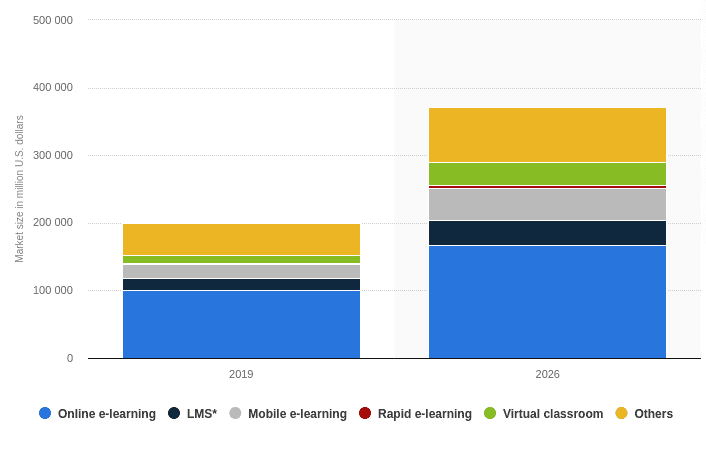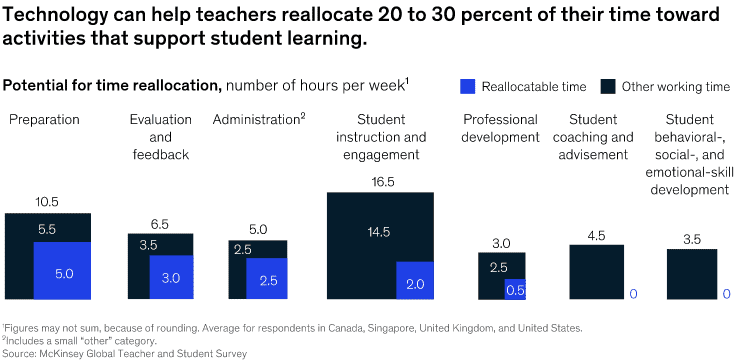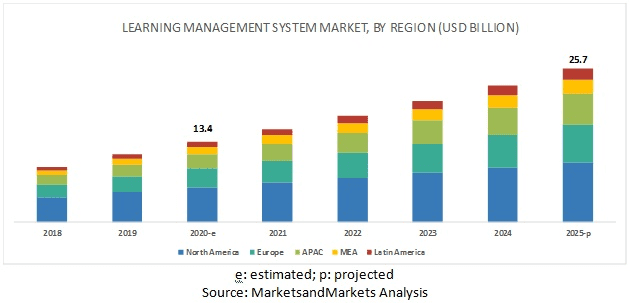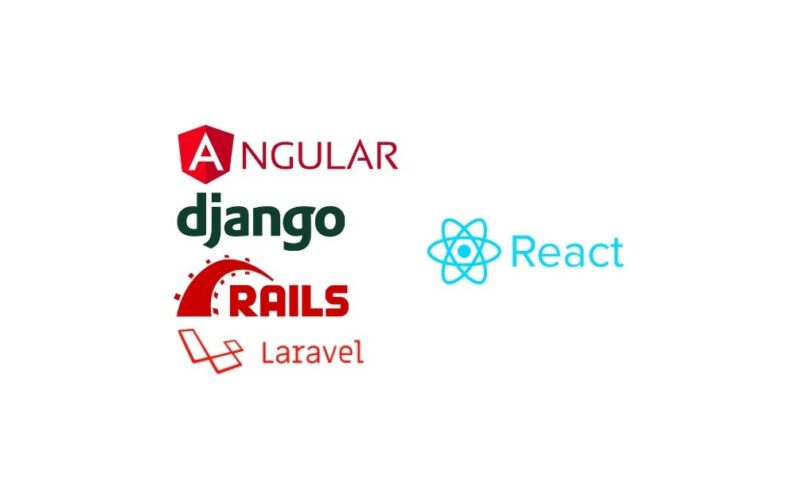To win in the education sector today, you must strategize and embrace emerging technologies. Technology intervention is enabling the digital transformation in education. Your CXO peers at colleges, universities, and corporate training centers are tapping into smart digital solutions to unlock agility and new growth channels across their educational value-chain.
Technology is transforming educational organizations by fundamentally changing
- how knowledge is delivered,
- how learners are evaluated, and
- how educational organizations operate.

The pandemic-boost and the industry forecast further bolster the future of tech-enabled Learning. E-learning is estimated to be a $325 Billion industry by 2025. To grab a pie of this, you must launch your e-learning platform. In-fact, every traditional organization specializing in education should launch eLearning portals. You can start with an MVP and then iteratively introduce new features to enhance the learning, as well as teaching experience. Read this insight and discover ways to scale your educational organization with digital transformation.
Why You Need Digital Intervention In Education
- Digital technologies like AR, VR, Cloud, AI, Web & Mobile are enabling educational organizations to attract broader audiences. There are no seating, infrastructure, or geographical limitations if you leverage cloud capabilities. You can build your product to scale on a need-basis.
- Digital transformation also boosts organizational flexibility, helps in cutting-costs.
- We’re in a technology-disrupted economy where things are evolving at an unprecedented rate. Continuous learning and upskilling are a necessity for learners and professionals alike. They can learn anywhere, anytime. Better skilled employees can translate into business profitability.
Digital transformation in the education sector

Digital transformation in any industry means re-imagining products, processes, and how people operate by utilizing disruptive technologies. Effective implementation of a digital transformation strategy results in enhanced efficiency, agility, scalability, and security.
The end-results of digital transformation in education means:
- A better learning experience for learners
- Better teaching experience for teachers
- Digitization of conventional, educational infrastructure
Digital transformation challenges in educational institutions
- Scripted curriculum
- Overworked teachers
- Lack of digital skills
- A lack of direction or strategy
- Inaccurate and unreliable data
How to Innovate in the Education Sector
Turning your disruptive idea into a reality is not as hard as it seems. In fact, we’ve proved it time and again by:
- Re-building one of the world’s largest edTech platform for enhanced scalability
- Building an Online k-12 platform for competitive exam preparation
- Architecting LMS for insurance agents
- Developing Social media for Scientists, enabling them to share whitepapers and ideas
Here’s how you can devise a digital transformation strategy for your institution:
- Evaluate how digital savvy is your organisation.
- Set a clear goal for your institution that you seek from digitization.
- Assess what tools do you have at your disposal to assist you in achieving this goal?
- Decide what tools & technologies you need to realize the above goal.
- Decide whether
- you want to build an in-house digital talent pool, or
- you want to outsource to experienced edTech development service providers
- Develop an MVP, launch it to the market
- Collect data around app uses, user behavior, business metrics, Invite user feedbacks.
- Analyze, apply the learnings & insights, iteratively develop and release new features.
To assist you in the decision making, we list some of the common edTech solutions that you can build and the technologies that help you renovate and re-imagine your institution:
Personalized Learning Management Systems (LMS)

The global LMS market is estimated to grow at a CAGR of 14% to $25.7 Billion. LMS can be web or device OS based software. It has applications in content management, performance management, communication, collaboration, and administration of academic processes. Modern LMS makes use of sophisticated machine learning algorithms to make personalized course recommendations to learners.
Digital assessment solution
You can build intelligent digital assessment solutions for the web, mobile, and edge devices. Augment these assessment tools with analytics capabilities to create powerful, personalized & interactive assessments on the go. In a matter of clicks, teachers can embed these assessments into the existing digital curriculum, and make it accessible to the learners anywhere, anytime.
Lecture capture solution
This too will fall under LMS but with a specialization to be highly instructor-friendly. You can develop edTech solutions to stream and record live lectures. Also, you may leverage technologies like PubNub to quickly build live engagement capabilities into your LMS software. When you scale, you interact with learners of diverse backgrounds, with different learning patterns, etcetera. To enhance their learning experience, your LMS should be built for flexibility. Learners & instructors should be able to exchange ideas & concepts both before and after the class.
VR powered immersive learning platform
STEM skills are essential today. And to enhance the scientific skills of your learners in high-schools & universities, you can avail them of fully immersive and interactive virtual science labs. These VR-powered digital science labs enable learners to conduct simulated experiments right from the comfort of their laptops, desktops, and mobiles. With VR powered immersive learning platform, your learners can dissect a frog virtually or can learn to build a robot without short-circuiting boards. Wouldn’t that be amazing?
Library solutions
Technological advancements have made it possible for the libraries to shift from card catalogs to digital automated solutions for
- creating, distributing, and managing books inventory,
- visitor management,
- acquisition management,
- books inflow and outflow,
- fee collection,
- shelf management, etcetera.
Digital learning marketplace
MOOC course marketplaces like Coursera, Linkedin Learning, NPTEL, Udemy, Khan Academy, Pluralsight, UpGrad, etcetera are no secrets. You can build your own marketplace for selling skill development courses. Digital learning marketplace solutions can be a blend of all the above solutions. It can make use of emerging technologies like ML for personalized learning path creation, blockchain for contractual certificate issuance, VR/AR for assisting instructors in knowledge delivery, and can integrate multimedia tools to create eBooks, audiobooks, instructor-led video courses, live interactive classes and so much more.
To sum it up
Building and adopting digital tools can be your first concrete step towards embracing digital transformation across your educational organization. Adaptive and blended learning, peer-to-peer learning, AI-enabled chatbot, blockchain-powered certificates, ML-powered career assessments, VR/AR-powered Labs and smart classes, remote tutoring, and proctoring are some major trends in the education sector in 2021.
What are you building?
Strike a conversation with EdTech thought leaders at Codewave to brainstorm on the right architecture for your revolutionary edTech idea and to build your solution the right way.
Additional read: GraphDB for delivering personalized in the moment learning.
Frequently Asked Questions(FAQs)
1. What is digital transformation in education?
Digital education transformation refers to the process of incorporating digital technologies into the educational system to enhance teaching and learning experiences, and improve the accessibility and efficiency of the education system. This can include but is not limited to, digital textbooks, online learning management systems, gamification, and learning analytics among others.
2. How can digital transformation improve education?
Digital transformation can improve education by providing new and enhanced ways of teaching and learning, such as online and blended learning, virtual and augmented reality, personalization and adaptive learning, and data-driven decision-making. It also improves the accessibility of education by making it more inclusive and reachable to learners in remote and underserved areas.
3. What are some common challenges faced in education digital transformation?
- Limited access to technology, especially in under-resourced and remote areas.
- Insufficient teacher training and support in using digital tools.
- Lack of funding and resources to implement digital initiatives.
- Difficulty in measuring and assessing the impact of digital technologies on learning.
- Keeping up with the constant evolution of digital technologies.
- Increased screen time for kids concerns parents and hence resistance towards edTech.
4. How can educators and institutions prepare for digital education transformation?
- Regularly evaluate the technology needs of your students and teachers.
- Invest in professional development for teachers and staff, esp digital skills.
- Encourage collaboration and innovation in the use of digital technologies.
- Collaborate with other educators and institutions to share best practices and ideas.
- Plan for the long-term integration & adoption of digital technologies into education, rather than focusing on short-term projects.
Codewave is a design thinking led digital transformation company enabling organisations with playful innovation using AI & ML, IoT & Edge, AR, VR, Cloud, Blockchain, and Data.







